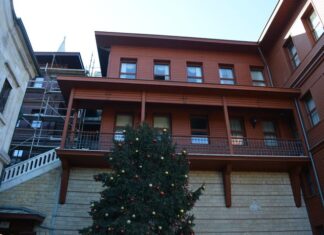They embarked in their boats, and intended to sail down the river to the sea. But Elchanes guessing Alexander’s intention took possession beforehand of the exit from the lake and the bridge over the river, on which a shrine to the memory of Constantine the Great was built of old by St. Helena, and from this the bridge took, and still takes, its name. At the exit from the lake then and on this bridge he posted some of his bravest men on either side with orders to watch for the passing of the fleet.
Thus all our men who were on board these small vessels fell straight into Elchanes’ ambush as they passed through the mouth of the lake, and losing their heads at sight of the sudden danger they drove the ships to land and jumped ashore. The Turks overtook them and a serious battle commenced. Many of the leaders were captured and many too fell into the river and were swept away in its eddies. The Emperor could not brook this defeat, so sent out a considerable army under Opus to march overland against them.
Opus reached Cyzicus and took that without trouble; then he picked out three hundred adventurous men used to storming cities and dispatched them to Poemanenum. This city, too, they took at first onset and killed some of the inhabitants on the spot and sent the rest as prisoners to Opus, and he, as promptly, sent them to the Emperor. He then left Cyzicus and went on to Apollonias which he beset closely.
Some refused to join Opus
As Elchanes had no longer adequate forces to contend against him, he surrendered the city of his own free will, and he and all his blood-relations deserted to the Emperor, hence he enjoyed countless privileges, and obtained the greatest of all, namely, holy baptism. Some refused to join Opus, for instance, Scaliarius and he who later was created ‘Hyperperilampros’ … (for these belonged to the number of illustrious satraps), but when he heard of the Emperor’s benevolence and liberal gifts to Elchanes, they came over to him too, and obtained their heart’s desire.
For the Emperor was essentially a most religious man, and in his life and speech the high priest of all piety. He was very fond, too, of teaching our doctrines and was a real missionary by choice and in his manner of speech; he wanted to bring into the fold of our church not only the Scythian nomads, but also the whole of Persia, as well as the barbarians who inhabit Libya and Egypt and follow the rites of Mohamed.
Read More about Rhodope Mountains – Legends and Reality








